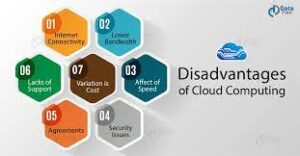How Cloud Stores Data? The Advantages & Disadvantages of Cloud Services
Data is a huge untapped resource that needs to be protected. How does your business plan to protect its most valuable asset? Protecting your data must use a multi-pronged approach and extend from internal policies and training to the technologies used. Here we will discuss one of these valuable technologies- the cloud. Data and files can be kept off-site and securely accessible from anywhere by using the cloud. So how cloud stores data?
Contents
What is the Cloud?
The cloud is a collection of computers on the internet that companies are using to provide their services. A cloud service is being offered which is a revolutionary storage method for your data. From music files to photos to sensitive documents, the cloud invisibly backs up your files and folders and reduces the search for costly and endless additional storage space. An alternative to buying an external hard drive or deleting old files to make room for new files, cloud storage is convenient and cost-effective. It works by storing your files on a server on the internet somewhere instead of on your local hard drive.
Traditional Servers vs Cloud Servers: What are the differences?
Traditional servers
Traditional servers are physically installed in the room and store your data on hard drives. Usually, there are two types of traditional hosting with physical servers that are dedicated and shared. With dedicated hosting, a company pays for one or more servers and a service provider’s entire resources. The company gets a dedicated amount of bandwidth, RAM, disk space and CPU, and has full control over server resources. With shared hosting, a company gets a lower maintenance and more cost-effective plan from the service provider.
Cloud Servers
A cloud server is an online system that stores your data on the internet through websites. Cloud storage services store your data on multiple servers, balance loads, and provide redundancy. You can save time and money by using service providers to store, operate, and maintain all the required gear and software.

Advantages of Cloud Services
The cloud service stores your files and data in a secure data center off-site. When you choose a quality cloud service provider, you get the following benefits:
- Secure storage: The cloud keeps files safe during natural disasters, such as fire, flood, hurricane, earthquake, or global pandemic because data can be stored off-premises in a secure data center or across several locations in disaster recovery facilities.
- Information management: Employees can get customer information easily through the cloud. You can even set the level of access, so the information is only available to interested parties, and remove access with the click of a button for those who no longer have access. Make it easy to manage data from anywhere.
- Cost transparency: With cloud storage, there is no need to purchase hardware, specify physical storage space, or urgently need capital to account for large-scale emergencies. Businesses can add or subtract storage as required, effectively change performance, and pay only for the storage actually used.
- Ideal for collaboration: Storing data in the cloud is an ideal way to collaborate and bring together multiple individuals/teams. People can access the cloud anywhere around the globe and collaborate in real-time. Data stored in the cloud can also be easily and securely shared with colleagues and customers.
Disadvantages of Cloud Services
The main disadvantage of cloud services is that cybercriminals can get into your data by bypassing or guessing your password or security question. There is also the risk of data being accessed and seen, even if it is not stolen or copied. Legally, the government has the right to request any data stored in the cloud, and you will have to provide it. Cloud strategies for data protection are sometimes slower than actual cloud usage, leaving companies at risk of exposure.

How cloud stores data?
Any cloud system at the basic level is a single data server connected to the web. A facility that contains many servers is called a data center. Previously, when a user saved data on his computer, the data would be copied to an off-premise server. With the cloud, physical servers are eliminated and data is stored on servers in the data center. The server that stores a particular user’s data is rented/rented monthly to the user. This usage may increase or decrease and the customer is charged only according to usage. This is how the cloud works commercially.
Looking at it from a technical perspective, cloud storage stores user data by sending a copy of that data over the internet to a data server that records the information. This information is retrieved on demand through a web-based interface. Users can access, manipulate or delete data according to their needs in the same way as using a computer’s hard disk. A cloud is only a virtual “Hard Disk,” to put it simply.
Storing multiple copies of the same data on multiple cloud servers for backup during maintenance or repair is known as Redundancy. This ensures users can access their data at any time from anywhere even while the cloud is being upgraded. This ensures that the user has his data available even if his personal system crashes. In a nutshell, this is how data is stored in the cloud.
Conclusion
Storing data in the cloud brings a lot of benefits to businesses. Regardless of size, industry or location, businesses will benefit greatly and create efficiencies throughout the organization. Online cloud storage also allows you to fully focus on your work without fear of data loss. It will free you up more time and allow you to redirect your focus to achieving your business goals. Today’s article has explained what the cloud is, its advantages and disadvantages as well as how cloud stores data.
Conclusion: So above is the How Cloud Stores Data? The Advantages & Disadvantages of Cloud Services article. Hopefully with this article you can help you in life, always follow and read our good articles on the website: Peto.info




